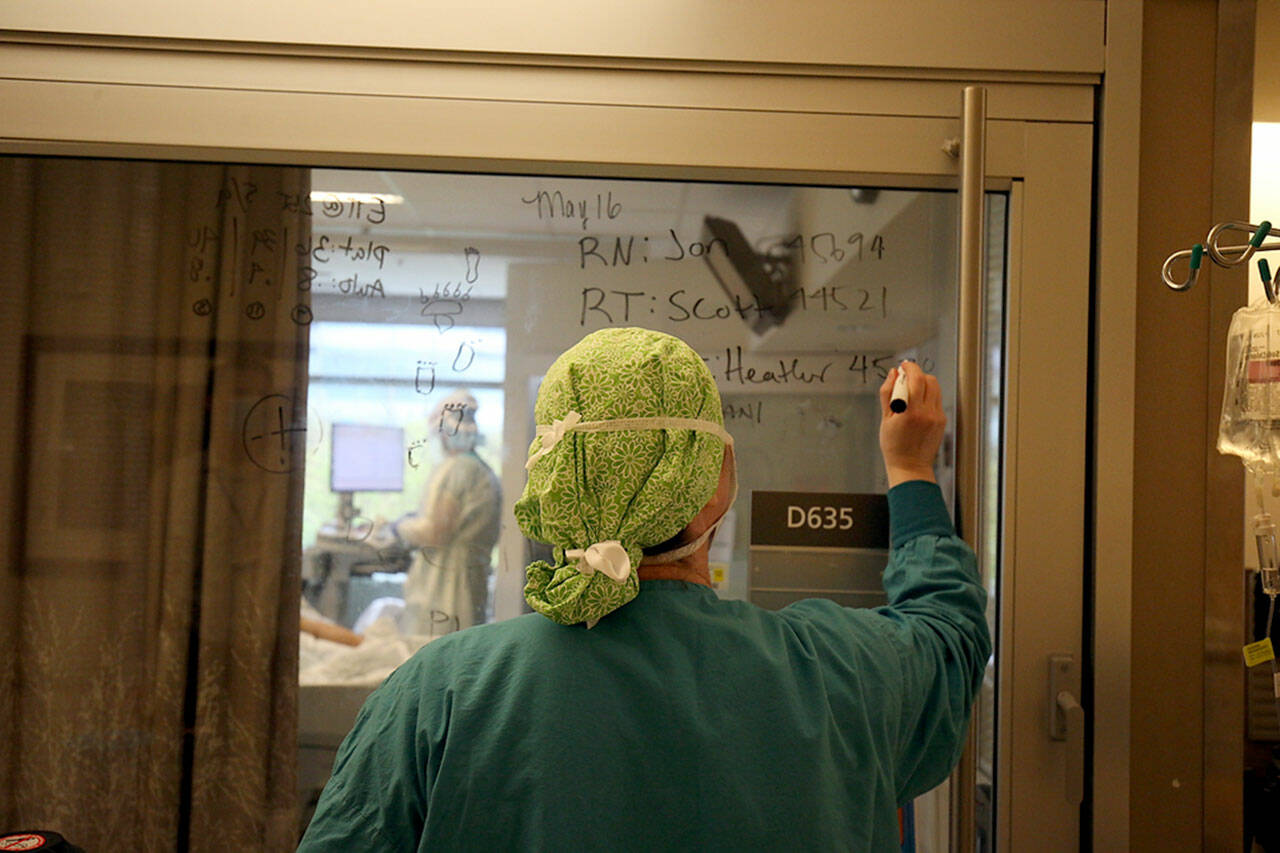By The Herald Editorial Board
The call from nurses at Providence Everett Medical Center for hazard pay at the hospital system’s two campuses in the city might seem a delayed plea for help after two and a half years of the covid-19 pandemic, especially considering the more relaxed attitude now displayed by most toward covid.
Even the Centers for Disease Control and Prevention has eased its guidance on response when people come in contact with those infected.
While the pandemic’s case rate has dropped significantly since the worst of the omicron surge this winter, case rates in Snohomish County are similar to what was seen during earlier surges during the winter of 2020-21 and last summer and fall.
However, the hazard that nurses appear most concerned about — and which the hospital’s leadership readily acknowledges — isn’t the possibility of contagion but rather the condition in which the pandemic has left Providence specifically but also other hospitals and health care in general, including a hollowed-out complement of nurses and other health care workers, rampant fatigue among staff and crowded hospital units.
Those conditions have been described in detail for several weeks before the Everett City Council by nurses and others during the council’s public comment periods but also in two hours of discussion among Providence Everett officials, nurses, others and council members at its Aug. 3 meeting.
Heidi DeBauge, a trauma nurse at Providence for more than three years, at the council’s July 27 meeting described patients placed in hallways and seated in chairs, because of a lack of rooms and beds. The conditions, DeBauge said, have led to a cycle of burnout among the nursing staff and the departure and early retirement of nurses, which compounds the workload and the fatigue of those who remain.
In the first half of this year, even as Providence has hired between 10 and 15 nurses a month, it has suffered a net loss of more than 90 nurses, a hospital official later told the council. The Everett hospital expects openings for some 250 nurses currently, but is seeking to fill those positions at a time when hospitals across the state are facing a shortfall of 6,100 nurses.
“We cannot weather this storm. We cannot hold on much longer,” said DeBauge, in comments that were posted to social media.
“We’ve been asking Providence for hazard pay since March 2020. Instead Providence decided to vest in a quick fix of paying up to three times the amount for travel nurses to work in our hazardous conditions,” she said. “Our core staff has withered as the years passed and no action was taken to retain the core staff.”
The hospital’s leadership, including chief executive Darren Redick, confirmed — and expanded on — the dire situation. The hiring of “travel nurses,” signed to 13-week contracts, fill immediate needs in specific areas but, he said, “are very, very expensive.”
The pandemic and other longer-term problems, Redick said, have forced Providence and other hospitals in the state and elsewhere into less-than-ideal solutions, including the temporary closure of units so that medical staff can be moved to areas where the need is most critical. Providence closed its pediatric unit about six weeks ago, and doesn’t plan to reopen it until it can hire enough staff to run it.
Hazard pay may not cure what’s ailing Providence and its nurses. And, following advice from the city attorney, the council likely doesn’t have the authority to require it of the hospital.
“What I’m hearing loud and clear from our caregivers is the working environment and the workload” are the main concerns among hospital staff, Redick told the council.
Fixes to those issues will take longer to address, but there remains a role for the council and the city and its residents at large to play.
What Providence and other hospitals and care facilities need are changes that are in the power of state and federal lawmakers to accomplish.
The greatest problems faced by all hospitals, Redick and others said, are a lack of available nurses for hiring, inadequate reimbursements for Medicaid and Medicare patients and a gridlock of patients who no longer require a hospital’s level of care but can’t be moved to more appropriate settings at nursing homes and other care settings because those facilities are facing their own nursing shortages and financial constraints.
Currently, Providence is caring for about 100 patients, Redick said, who are medically stable and could be moved to nursing homes, but remain at the hospital, occupying beds and requiring the time of nurses and other staff who are needed for other patients who now wait in the emergency department for an open bed.
Changes are needed at state and federal levels to adjust the reimbursement rates for Medicare and Medicaid, which for Medicaid were last increased 20 years ago; ease the rules that would broaden family members’ authority to allow transfer of patients to nursing facilities’; and investments in medical education that can more quickly build the ranks of nurses, medical technicians and others.
“We want the city to advocate before lawmakers; we need your voice to help make these changes,” Redick said.
Lawmakers at the national and state level did respond throughout the crisis with aid — including $178 billion authorized by Congress — directed at hospitals and other providers nationwide, that helped sustain the primary provider of care through the worst of the pandemic.
But the fight against covid has taken a toll on hospitals and their staffs that has endured even as the pandemic — we can hope — has begun to ease.
Providence Everett, which cared for the country’s first covid patient at the very start of the pandemic and has saved countless lives since then, now needs — along with other hospitals and their staffs — the public’s care and support to continue saving lives.
Talk to us
> Give us your news tips.
> Send us a letter to the editor.
> More Herald contact information.

























